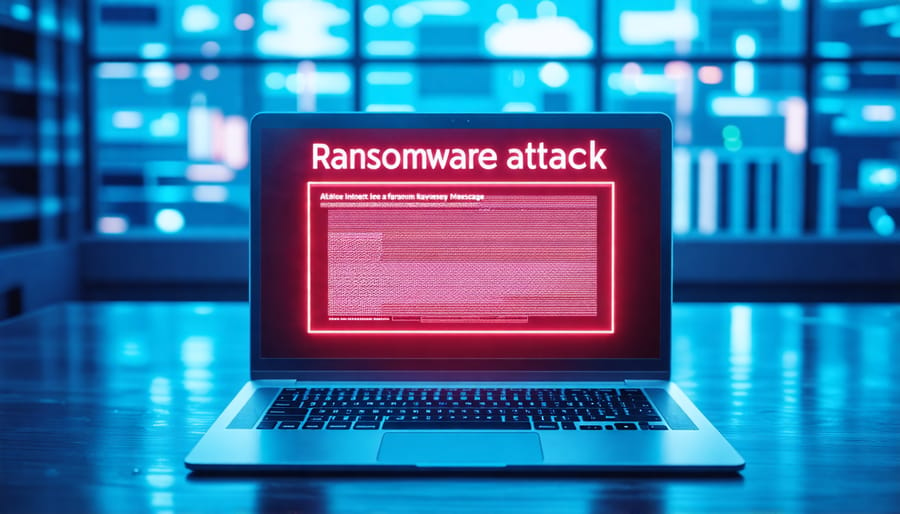Protect your construction firm’s data from the top 5 cyber threats. Implement multi-factor authentication and strict access controls to prevent unauthorized entry. There are many ways to hack construction firms, so encrypt sensitive data both in transit and at rest. Regularly patch and update all systems to fix security vulnerabilities. Train employees to spot phishing attempts and report suspicious activity. Continuously monitor your networks for anomalies that may indicate a breach. Taking proactive measures is critical to safeguard your intellectual property, financial information, and project data in today’s high-risk digital landscape.

Ransomware Attacks Targeting Project Files
Preventative Measures
To prevent ransomware attacks and safeguard sensitive data, construction firms must implement a multi-layered approach to cybersecurity. Employee training is critical, as human error is often the weakest link. Educate staff on identifying phishing emails, creating strong passwords, and following security protocols. Regularly back up data to secure, offsite locations or cloud storage, ensuring quick recovery in case of an attack. Keep all software, including operating systems and applications, updated with the latest security patches. Implement robust endpoint protection, firewalls, and intrusion detection systems to monitor for threats. Limit employee access to sensitive data based on their roles, and revoke permissions when no longer needed. Establish an incident response plan to minimize damage and ensure business continuity. Regularly conduct security audits and penetration testing to identify vulnerabilities. By proactively implementing these preventative measures, construction firms can significantly reduce their risk of falling victim to costly and disruptive ransomware attacks.

Phishing Scams Compromising Employee Credentials
Employee Education and Policies
To mitigate the risk of phishing attacks, construction firms should prioritize regular security awareness training for all employees. These sessions should cover how to identify suspicious emails, avoid clicking on malicious links, and report potential threats to the IT department. Implementing clear password policies is also crucial, requiring employees to use strong, unique passwords and enable two-factor authentication whenever possible. By educating staff and enforcing robust password practices, companies can significantly reduce the likelihood of successful phishing attempts and protect sensitive data from unauthorized access. Investing in ongoing training and maintaining open communication channels about security concerns will help foster a culture of vigilance and empower employees to serve as the first line of defense against cyber threats.
Unsecured Mobile Devices Accessing Company Networks
Mobile Device Management Solutions
Mobile Device Management (MDM) solutions provide a robust layer of security for employee mobile devices in the construction industry. These software platforms allow IT teams to remotely monitor, manage, and secure smartphones, tablets, and laptops used by field workers and office staff. Key features include device enrollment, app management, data encryption, and the ability to remotely wipe lost or stolen devices. MDM also enables enforcing strong password policies and securing IoT devices like wearables and sensors. By centrally managing mobile devices, construction firms can mitigate risks associated with data leaks, unauthorized access, and malware infections, ensuring sensitive project information remains protected.

Internet of Things (IoT) Device Vulnerabilities
Securing the IoT Ecosystem
To secure the IoT ecosystem in construction, industry professionals should implement network segmentation, isolating IoT devices on separate networks to minimize the impact of potential breaches. Strong authentication measures, such as multi-factor authentication and complex passwords, are essential for preventing unauthorized access to IoT devices and data. Regular software and firmware updates are crucial to address newly discovered vulnerabilities and maintain the integrity of IoT systems. Encrypting data both in transit and at rest adds an extra layer of protection, ensuring that even if data is intercepted, it remains unreadable to unauthorized parties. By adopting these best practices and working closely with IoT vendors to ensure device security, construction firms can significantly reduce the risk of IoT-related data breaches and maintain the confidentiality and integrity of their sensitive information.
Third-Party Vendor and Subcontractor Risks
Vendor Risk Management
To effectively manage vendor risk, construction firms should establish a thorough vetting process. This includes evaluating each vendor’s cybersecurity practices, data handling policies, and compliance with relevant regulations. Formal service level agreements (SLAs) should outline the vendor’s responsibilities for maintaining data security and the consequences of any breaches. Regular audits are essential to ensure ongoing compliance with these agreements. Firms should also have a clear incident response plan in place, detailing how vendor-related security issues will be addressed. By taking a proactive approach to vendor risk management, construction companies can minimize the likelihood of data breaches originating from third-party providers. Collaboration with vendors is key – working together to identify and mitigate potential vulnerabilities will strengthen the overall security posture of both parties. Ultimately, a robust vendor risk management program is a critical component of any comprehensive data security strategy in the construction industry.

